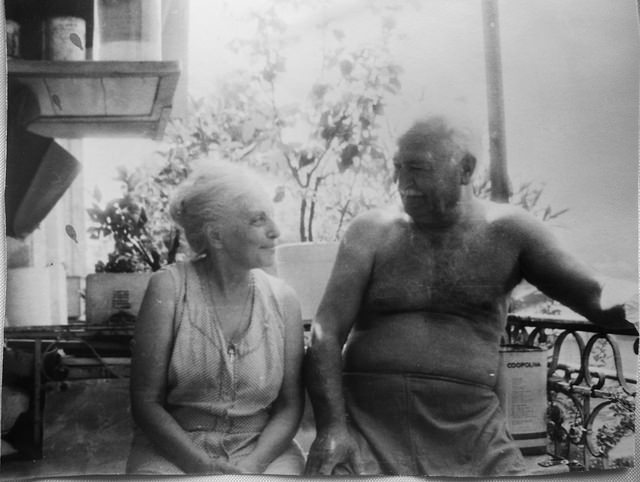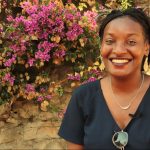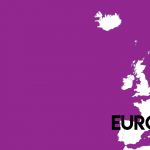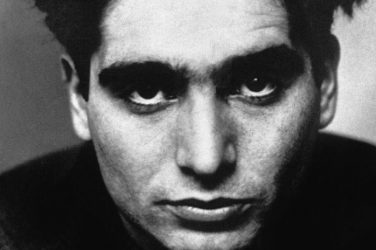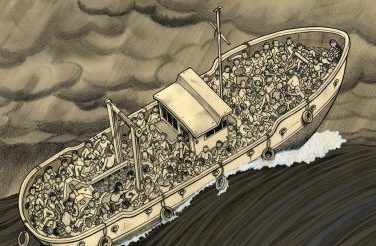E&M‘s Sarah Gerwens delves into the stories our grandparents can tell us about Europe – and about ourselves.
I have been raised on the Western side of the Iron Curtain, listening to ABBA on my record player and going to church every Sunday. I have been raised to distrust mass movements, political extremists, and Russian politics, to eat expired yoghurt and buy in bulk. I have been raised by my grandparents, my Oma and Opa, who brought me up on stories of the past and promises about the present. While they were children of the Second World War, born too late to be complicit but too early to be oblivious, I am (not only literally) a child of an ‘ever closer union’. In my passport, I carry a Russian and a U.S. visa only pages apart and ‘war’ is something that happens in the news, the movies, and the past.
But in my grandparents’ and my home the present was never fully able to leave the past behind. In our home, I learned that you can’t really forget how to survive a war. My grandfather never stopped storing extra soap on top of the bathroom sink, always buys at least five cans of pea soup ‘just in case’. My grandmother nervously watches the news every night, she warns me never to follow a fanatic, and distrusts even soccer hymns. And my grandparents remember. They remember living their lives to the rhythm of the air raid sirens, the hunger, the bathwater in the basin on the kitchen table (in which the boys always got to bathe first). These are stories told in passing, memories that resurface after war movies and wine, or in the company of older friends and family. Stories like scars you retrace once in a while to remind yourself that you survived, to make sure the bleeding really has stopped.

“My great-grandfathers denazification camp clearance certificate”
My grandmother says: “we needed fantasy to survive”; her mother made pickled potato pancakes and told the children they were herrings, she sowed the dress for her first communion out of parachute silk. As the Soviet army came closer and closer to their hometown, Zabrze (Hindenburg as they called it), now Poland, the front line shifted Westwards over their heads. While bombs fell and their neighbours and friends fled, they had to stay: my grandmother’s father was ordered by the Nazi generals to secure the city’s food supply. Only when the army gave up the city in March 1945 were they allowed to leave.
When my grandmother sees pictures of refugees today, she says that she remembers what it’s like. She remembers marching past wounded soldiers and dead bodies, through towns in which the Wehrmacht had been and where widowed women were looking for their children in the rubble. In Czechoslovakia, the Czech army rounded up German refugees in a warehouse on the outskirts of Prague. The soldiers were separating mothers from fathers from children to send them to labour camps.
Only because my great-grandfather bribed the guards with jewellery he had hidden in the seams of his shirt were they allowed to leave. Unable to stay in Czechoslovakia, my grandmother’s family kept on walking until they reached Germany. However, no one wanted to house Silesians – people from the central European region around the Oder river, people like my grandmother. Without permanent shelter, my Oma’s family decided to return home that summer. They walked 25 miles a day, for days. All they had left was the clothes they were wearing (two layers of each garment) and a barrow. Sometimes my grandmother was allowed to sit on top of it when she got tired – she was only six years old. But the war was finally ending and they imagined what it would feel like to return home. Until they reached the new Polish border, where they were told to turn around: home no longer existed; not their house, not their neighbours, not even the name of the city had remained.

Born in Western Germany, my grandfather didn’t flee. But his sister remembers how they got shot at while picking potatoes: “you had to lay close to the ground and wait for it to be over. You could see the soldiers in the planes pointing their guns at you, that’s how low they were flying”. In the last year of the war, they were no longer in school, because school no longer existed. Instead, my grandfather dug out trenches around their town and imagined himself to be a priest one day. When the allied forces crossed the Rhine and started bombing infrastructure around their hometown, my Opa and his father stood outside of their family’s farm. They felt the ground shake from the bombs, the air smelled like fire and blood. As they watched the landscape disappear, my great-grandfather turned to this son and promised that the Führer would unleash his secret weapon any day, any day now. But he didn’t, the Führer was dead. Instead, more bombs fell to free them from their own dictator and when the Americans came, my grandfather’s town cheered: it meant the war was over.
I’ve seen my great-grandfather’s documents with swastika-stamps that my Opa keeps in a Ziploc bag on top of the safe. Among them is a clearance certificate that his father received upon release from a British de-nazification camp. But history cannot be cleared, there is no document that can certify its completion. It offers no resolutions and does not get tired of repetitions: for the first time in 50 years, a far-right party has entered the German parliament. Populism is on the rise again; the truth has become an alternative among others. And while Europe now has shifted walls, war, and desperation to its fringes; we have outsourced suffering rather than ended it. As refugees cross through the continent once more, peace remains a privilege and our passports a status symbol.
Growing up with my grandparents, I have learned that history is a duty, not a choice. It demands to be remembered.
Growing up with my grandparents, I have learned that history is a duty, not a choice. It demands to be remembered. And while there is no single story of the war, of the bombings, the burned bodies, the Holocaust, the refugees; these stories need to be told. History is always a collection, a competition of accounts. So, we need to collect them. As a granddaughter, as a German, as human, I have to collect them. Because “those who cannot remember the past are condemned to repeat it” (George Santayana).
Cover Photo: Photo:Nika Gedevanishvili (Flickr);License: CC BY 2.0


